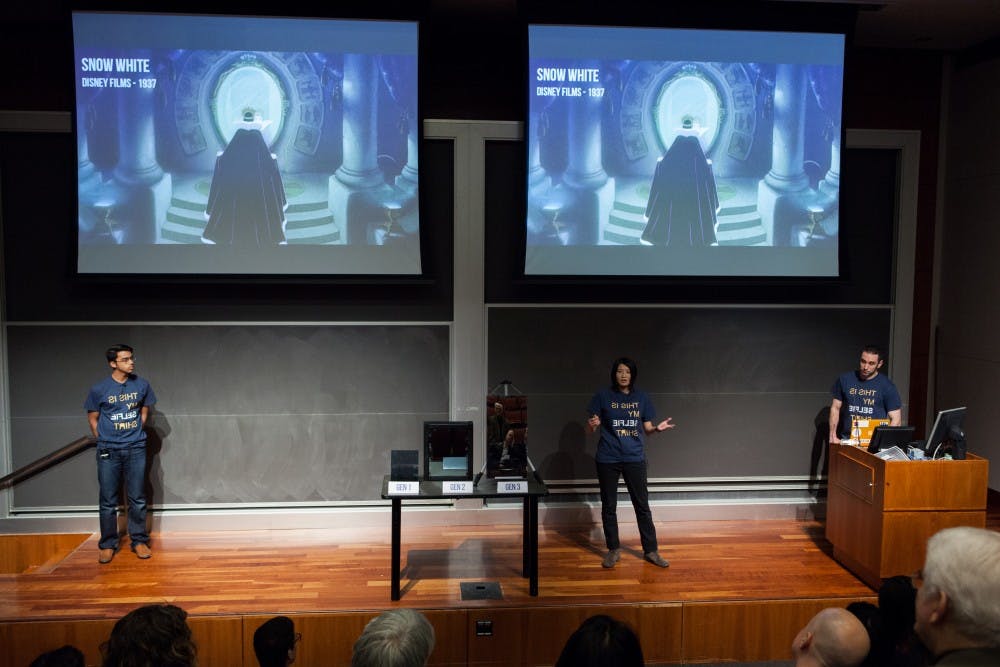
| Photo from Weiss Tech House
“They can enter the competition with an idea, utilize the resources that we have to offer, and then come out three months later much closer to a product or even ready to begin selling their product,” Pennvention Co-Chair and College junior Jordan Rosenthal said.
Credit: Lamont W. Abrams Jr.A self-composting toilet, an online student health insurance platform and a light automation device may seem entirely different from each other, but all three ideas — and five other innovations — were showcased at the Pennvention final round Wednesday.
Teams of Penn undergraduate and graduate students pitched their start-up ideas to a panel of judges at the Wu and Chen Auditorium.
The competition, which is run by the Weiss Tech House, strives to promote technological innovation by rewarding the most promising proposals with funding and mentorship opportunities. The grand prize winner, Pinch, developed an automated kiosk that dispenses various spices,
“A toilet can [compete] against a neural brain activity device, so you have very different ends of the spectrum,” Director of Weiss Tech House Anne Stamer said. “While we hit trends, much of it is actually trendless because it’s really about the people working on the idea and moving along.”
Pennvention garnered more than 75 submissions, whittling down the number of teams to eight after two rounds of judging. Throughout the three-month process, teams sharpened their ideas by seeking guidance from 50 mentors whose expertise spans business, law and other fields.
“They can enter the competition with an idea, utilize the resources that we have to offer, and then come out three months later much closer to a product or even ready to begin selling their product,” Pennvention co-chair and College junior Jordan Rosenthal said. “We hope that by the end of the competition, they’re not only closer to completing their product but they also understand who it helps, what problem it’s solving and how they’re going to fit that need.”
NeuroFlow , the second-place team, constructed a digital health platform that equips doctors with biometric data, an objective tool that can inform treatments for posttraumatic stress disorder and other mental disorders. Comprised of undergraduates, MBA and Ph.D. students from Penn and Drexel University, the team has already been refining the product for 10 months and plans on delivering their platform to the U.S. Military Academy’s sports psychology program.
“Since the competition is a very time-sensitive thing to have something ready by today, we made decisions about what needs to be focused on and what can be put off until later,” Drexel senior Matthew Roll said. “That type of pressure is
The team also honed the product's presentation by preparing a video for the
“We learned how to present this software in a way that appealed to the general public and the judges, not just to the consumers and the physicians who would be using the software, and how to frame the software so that audience will get the most of what we show
Rosenthal hopes that everyone across Penn’s undergraduate and graduate schools — not just Engineering and Wharton students — will capitalize on the on-campus networks and resources for Penn student entrepreneurs seeking to jump-start their ideas.
“Everyone has a little bit of entrepreneurial spirit, and if they allow that to come through and if they put themselves on the line and pitch their ideas and find other like-minded entrepreneurs, people will be astounded by the support system and just how far they can take their ideas and their own drive."
The Daily Pennsylvanian is an independent, student-run newspaper. Please consider making a donation to support the coverage that shapes the University. Your generosity ensures a future of strong journalism at Penn.
Donate






